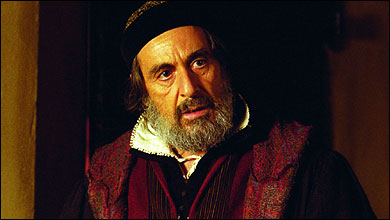
Directed by Michael Radford, “The Merchant of Venice,” which stars Jeremy Irons, Al Pacino, Joseph Fiennes and Lynn Collins, is better-than-average screen Shakespeare: intelligent without being showily clever, and motivated more by genuine fascination with the play’s language and ideas than by a desire to cannibalize its author’s cultural prestige.
Judiciously trimmed to manageable movie length, this “Merchant” is, for the most part, faithful in letter and spirit to its source material. I say for the most part because “The Merchant of Venice” has become, over the past century, perhaps the most vexed single play in the Shakespearean canon, and the first task of any modern adaptation is to confront the anti-Jewish bigotry that propels its plot and informs its poetry.
Mr. Radford’s approach to the problem of Shylock (Mr. Pacino) is to contextualize. Not only is the story punctually announced as taking place in “Venice, 1596″ – a kind of specification wholly alien to the time – but introductory titles provide some background about the marginal status and civic oppression of that city’s Jewish population. As in other parts of Europe, Venetian Jews practiced usury because they were denied access to other economic activities, and because lending money at interest, vital to the prosperity of the city-state and its merchants, was something Christians would not do.
None of which quite explains the character of Shylock, or dispels the taint of blood libel from the play – an impossibility in any case. The only real choice is either to declare “The Merchant of Venice” off limits or to allow its uglier qualities to continue to complicate its gorgeous flights of rhetoric and its brilliant inquiries into law, loyalty, the ethics of making promises and the quality of mercy.
After a bumpy beginning – Shakespearean dramas take longer to come into focus than do movies, whose audiences are accustomed to having everything in place after 10 minutes – Mr. Radford, who also wrote the screenplay, succeeds in rendering the complexities with clarity and vigor. Too many productions of Shakespeare’s plays, on stage and on screen, either push them into a contrived modern setting or chase after an irrelevant ideal of authenticity. Mr. Radford, helped by Bruno Rubeo, the production designer, and the exquisitely gifted cinematographer Benoît Delhomme, ingeniously views Shakespeare through the lens of his artistic peers and (approximate) contemporaries.
Watching the film is like seeing a gallery of Renaissance paintings come to life, and while the effect is occasionally contrived (the dwarves attending a Spanish suitor might as well have Velázquez logos sewn onto their clothes), it mostly deepens the wonder and strangeness of the play. To imagine the people envisioned and captured by Rembrandt, Vermeer, Caravaggio and Titian performing Shakespeare is to appreciate anew both the strangeness and vitality of early modern Europe, and to approach a visual understanding of the intellectual and artistic eclecticism that characterized the age.
But every production of Shakespeare, however well designed or sensitively directed, depends finally on the quality of the acting. I must confess I approached this film, in which Mr. Pacino’s name figures so prominently, with some trepidation, preparing myself for the latest installment in his scenery-chewing parade of Jewish Monsters Through the Ages. Since he had done Herod on Broadway and Roy Cohn on HBO, Shylock was only to be expected, and also perhaps dreaded, given the histrionic isolation that has distinguished his recent work. He restrains himself here, however, emphasizing Shylock’s grief as much as his viciousness. More than that, his estrangement from the other actors, a liability in more conventional movie dramas, makes sense, given Shylock’s status as an outsider, who speaks a rougher verse than his Christian antagonists.
Of these, Mr. Irons, as Antonio, the depressive merchant of the title, is quietly mesmerizing. Mr. Fiennes, as his young friend Bassanio (whose courtship of Portia impels Antonio to mortgage his pound of flesh to Shylock), recites his lines beautifully, but is upstaged by Kris Marshall, as his feisty second, Gratiano, and also by Ms. Collins, whose handful of television and movie appearances hardly prepare one for the radiant authority she brings to the role of Portia. Her charisma is crucial to Mr. Radford’s conception of the play, which places Portia – both a wily seductress and an exacting ethical intelligence – at its center.
Link: http://movies.nytimes.com/2004/12/29/movies/29veni.html?_r=0
